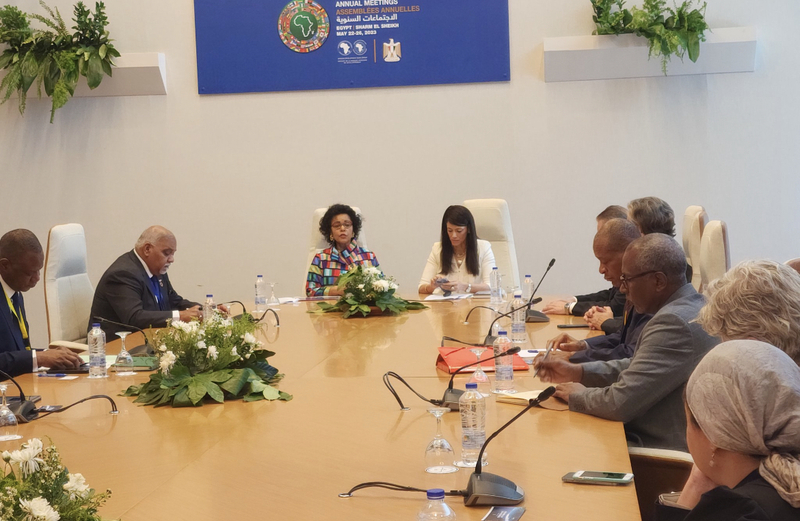AUDA-NEPAD CEO's Speech at the Session on Strengthening Economic Integration in Africa through South-South and Triangular Cooperation

AUDA-NEPAD CEO's Speech at the Session on Strengthening Economic Integration in Africa through South-South and Triangular Cooperation
Date: May 24, 2023
Venue: Room St Catherine - International Convention Center in Sharm El-Sheikh, Egypt
Your Excellencies, I take this opportunity to acknowledge:
At the outset, I would like to take a moment to acknowledge the Government of Egypt for its remarkable strategy and efforts in promoting effective economic South-South and Triangular Cooperation in Africa. Your unwavering commitment to inclusive partnerships has not only enriched the lives of the Egyptian people but has also had a profound impact on countless Africans across the continent. Through your dedicated initiatives and forward-thinking policies, Egypt has become a shining example for other nations to follow, demonstrating a deep understanding of the transformative power of such partnerships in driving Africa's development agenda.
As we gather here today on this historic occasion of Africa Day, commemorating 60 years of the existence of the Organization of African Unity, now the African Union, it is a moment of reflection and inspiration. It is fitting that we draw upon the wisdom of great African leaders who envisioned a united and prosperous Africa through collaboration and solidarity.
Haile Selassie, the visionary Emperor of Ethiopia, spoke of the necessity of African unity, stating, "African unity is a necessity; we have been divided for too long. We must unite and work together to overcome our challenges and achieve our aspirations."
These powerful words resonate with the fundamental principles of South-South and Triangular Cooperation. They remind us of the aspirations and dreams of a united Africa, free from colonialism and oppression, where peace, progress, and prosperity would reign. They call on us to embody the spirit of unity, shared responsibility and cooperation, and self-reliance in driving Africa's development agenda forward.
In this spirit, we must reflect on the challenges that still lie ahead, cherish our hard-won independence, renew our commitment to the task at hand, and build a better future for all Africans.
Excellencies, while we have taken positive steps towards the Africa We Want, we must also acknowledge that there is still much work to be done.
As the First Ten-Year Implementation Plan of Agenda 2063 comes to an end, we have seen marginal increases in the standard of living, quality of life, well-being, and education of our brothers and sisters.
Statistics reveal that Africa's average GDP is projected to stabilize at 4% in the next two years, up from 3.8% in 2022, demonstrating the need for accelerated growth and development. Despite this progress, we must recognize that the journey toward sustainable development is far from over.
We cannot turn a blind eye to the persistent crises that plague our continent—challenges such as land and water scarcity, ethnic and religious conflicts, and socio-economic disparities. These obstacles hinder the attainment of the people's agenda by 2063. We also face numerous challenges, including limited resources, inadequate infrastructure, and persistent socio-economic disparities.
To overcome these obstacles and realize our vision of a united and prosperous Africa, we must embrace innovative approaches and partnerships that harness the power of collaboration and cooperation.
In this context, South-South and Triangular Cooperation emerge as a beacon of hope and a pathway to transformation. By leveraging the diverse strengths and resources of African nations and our international partners, we can address common challenges, stimulate economic growth, and foster sustainable development across the continent. Through horizontal partnerships and collaboration among countries with similar experiences and challenges, we can share best practices, exchange innovative ideas, and learn from each other's successes and failures.
One of the key advantages of South-South and Triangular Cooperation is its emphasis on horizontal partnerships. It encourages collaboration among countries with similar development experiences and challenges, enabling us to share best practices, exchange innovative ideas, and learn from each other's successes and failures. It allows us to tap into the vast potential of intra-African trade. By strengthening economic ties within our continent, we can unlock new markets, promote industrialization, and enhance competitiveness. According to recent statistics, intra-African trade has the potential to increase by over 50% within a few years, creating immense opportunities for job creation and poverty reduction.
Across Africa, we are witnessing the emergence of impactful South-South and Triangular Cooperation initiatives, paving the way for transformative change. We must seize these opportunities and actively capture the best practices arising from these collaborations.
One such example is the PIDA Flagship Infrastructure Project Lamu Port-South Sudan-Ethiopia Transport (LAPSSET) Corridor. This transformative project aims to improve connectivity, enhance regional trade, and boost economic integration in East Africa. It is through such collaborative endeavors that we can lay the foundations for a more interconnected and prosperous Africa.
Excellencies, we must also acknowledge that challenges exist in implementing South-South and Triangular Cooperation effectively. Increased investment in critical sectors, such as infrastructure, technology transfer, capacity building, and institutional strengthening, is necessary. We must address these challenges through inclusive policies, robust governance frameworks, and a commitment to transparency and accountability.
In this regard, I must acknowledge that AUDA-NEPAD is working tirelessly to facilitate partnerships, provide technical support, and promote knowledge-sharing among African countries.
The Traffic Light System (TLS) initiative and One Stop Border Post (OSBP) Sourcebook are a testament to our unwavering commitment to bridging the information gap and ensuring the expeditious and orderly movements of goods and services across regions.
Our commitment extends beyond these initiatives. AUDA-NEPAD has emerged as a catalyst for such collaboration by providing a platform for African countries to come together and find common solutions to shared challenges. Our commitment to implementing practical ways to push forward the South-South and Triangular Cooperation agenda has been instrumental in harnessing the continent's resources and expertise.
For instance, the African Biosafety Network of Expertise (ABNE) has been working diligently to ensure the safe adoption of biotechnology in agriculture, thereby boosting food security and agricultural productivity. With our support, participating countries have experienced an average increase of 13% in agricultural output over the past decade.
Excellencies, Ladies, and Gentlemen,
As we strive to strengthen economic integration in Africa and realize the dreams of our founding members, we must prioritize the implementation of regional integration initiatives like the African Continental Free Trade Agreement (AfCFTA). By creating a single market for goods and services in Africa, we can achieve greater economic integration and pave the way for South-South and Triangular Cooperation. Inclusive and sustainable development, innovation and technology transfer, and enhancing our institutions and human resources are crucial in this journey.
My fellow Africans, as I conclude, let us remember the words of Thabo Mbeki, “the African renaissance is about reaffirming our commitment to ourselves and the reconstitution of Africa as a powerful entity on the global stage.”
Let us heed the call to rise above the challenges that confront us, overcome the obstacles that stand in our way, and forge a path of progress that is uniquely African.
With unwavering determination and a deep sense of pride in our heritage, let us build a future where Africa's voice resounds, where our contributions are recognized, and where our dreams are realized.
Thank you.



